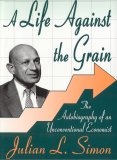
research published last year by Christian Leuz of the Wharton School, Dhananjay Nanda of the University of Michigan, and Peter Wysocki of MIT found that U.S. firms "managed," or distorted, their earnings the least among companies in 31 countries studied.So what's the rush to add more regulations that may do more harm than good?
Regulated transparency would not benefit companies, investors and consumers to the extent that the existing market mechanisms do. Imposing further regulated transparency beyond existing SEC regulations would weaken the network of private incentives that generate long-run efficiency through communicating information among firms, investors and consumers about their ideas, costs and resources. This web of private and public monitoring underpins the most liquid and profitable stock market in the world. We should not let legislation undermine these market processes.
His advice was also sought around the world. Most famously, in the 1970s he advised the military government of Chile - for which he received years of abusive criticism - and the communist government of China - which no one seemed to mind. Happily, both governments listened, and both have become "economic miracles." Chile now has the most successful economy in Latin America, and China's path along the "capitalist road" has made it more prosperous than anyone could have dreamed in 1976, the year that Mao Zedong died and Friedman won the Nobel Prize.
As someone who knows what it is to be rushed to the nearest hospital emergency room by paramedics because I forgot to take my medication, I am grateful that today's clever political schemes for controlling the prices of pharmaceutical drugs did not exist in years past, when these medications were being developed. Otherwise, I might not be here.
Wednesday, July 31, marks the 90th birthday of Milton Friedman, the most influential economist of the second half of the 20th century. Almost single-handedly, he rejuvenated the free market among professional economists, after a long period in which planning and socialism held sway.Friedman turns 90 tomorrow.
Too often, individuals, organizations and movements seize upon one particular kind of cost or danger and try to block it by all means possible. But how many miners' lives are we prepared to risk, in order to spare any inconvenience to Caribou near the Alaskan oil reserves? Or to spare the delicate feelings of nature cultists who will wring their hands over oil drilling that neither they nor 99 percent of the American people will ever see?
The evidence we have assembled suggests that having a living standard above the poverty line or a secondary school or higher education is positively associated with participation in Hezbollah. We also find that Israeli Jewish settlers who attacked Palestinians in the West Bank in the early 1980s were overwhelmingly from high-paying occupations. The conclusion speculates on why economic conditions and education are largely unrelated to participation in, and support for, terrorism.Also, read "Education may be key to extremist actions".
It was this fact—that economics assumed that people were basically all the same, and thus all entitled to liberty—that led Carlyle to label economics "the dismal science."